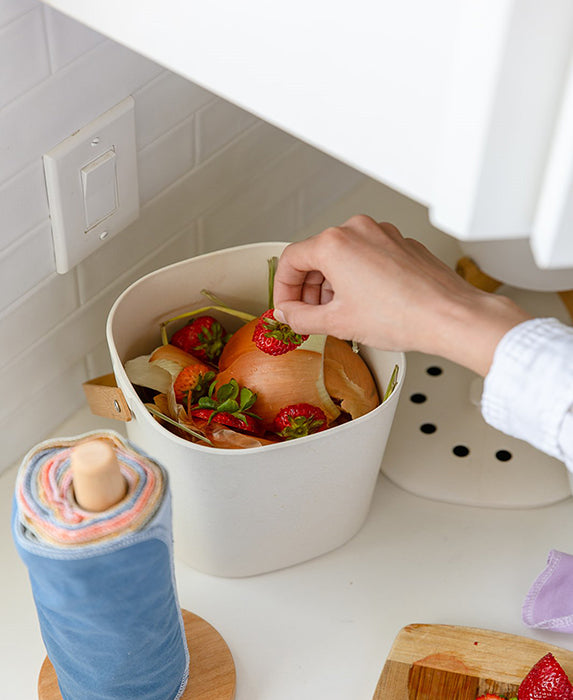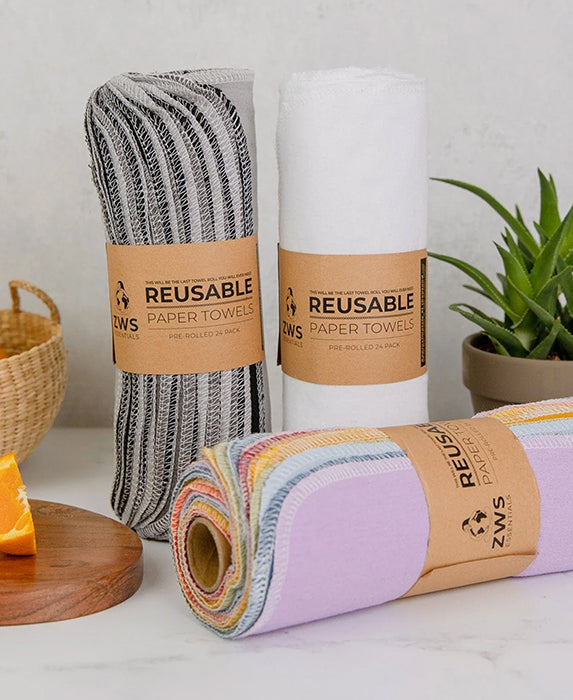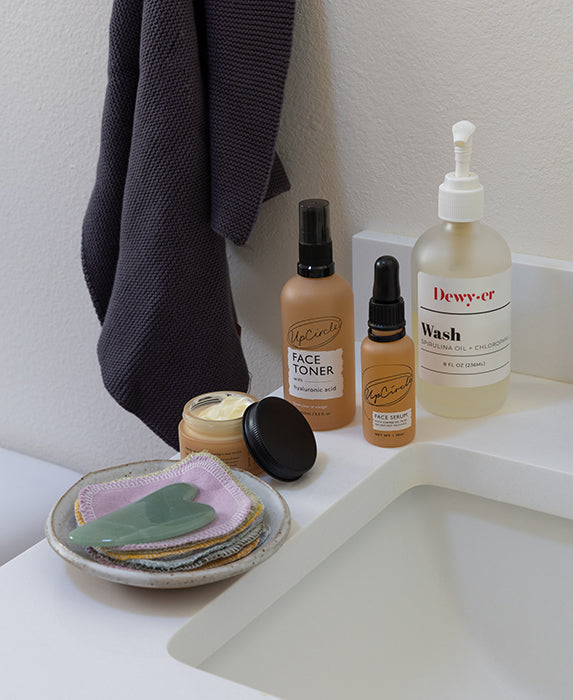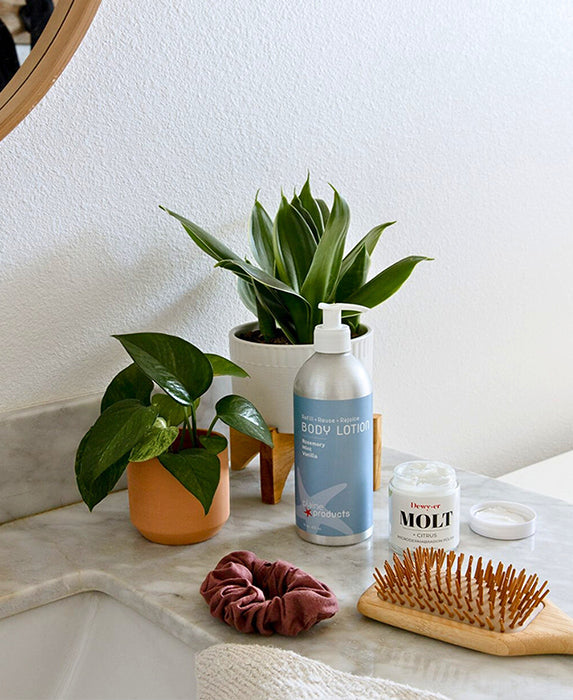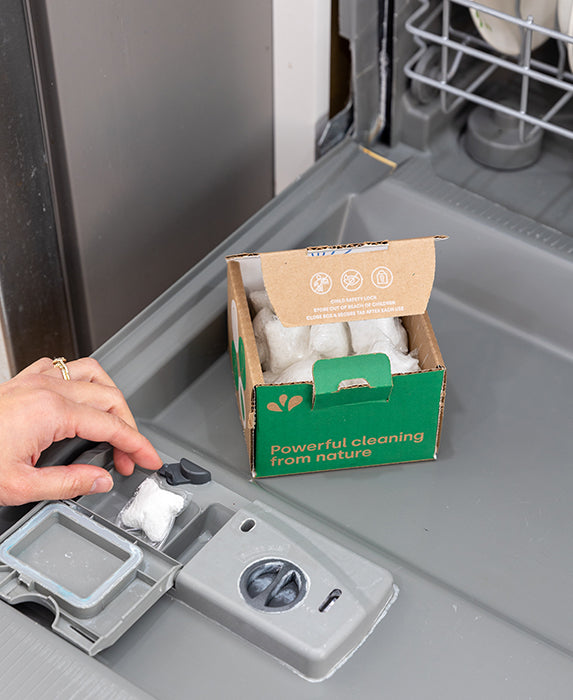Sourcing Pillar
Materials and Ingredients
When we look for new products to add to EarthHero, we search for the most sustainable and “best-in-class” ingredients and materials in the category. After all, what makes a t-shirt sustainable is very different from what you look for in shampoo!
Primarily, we prioritize organically-grown materials and ingredients. From natural, renewable fibers in our apparel to plant-based ingredients without artificial fragrances or colors, chemical sunscreens, or petroleum-derived sulfates in our clean beauty category, you can shop confidently knowing that our products are gentle on both you and the planet.
When it makes sense, we do source synthetic materials for items like clothing, but any synthetic material on our site must be made from at least 70% recycled materials. From backpacks and workout leggings made from rpET to skateboards made from recovered fishing nets, we love giving new life to landfill-bound plastics.
We believe it’s deeply important that the materials and ingredients that our partners use preserve and protect the planet for future generations.
Brand Highlights
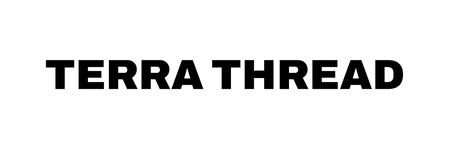
Terra Thread
Terra Thread’s commitment to sustainability and ethical practices starts in the field. Using exclusively Fairtrade America Certified Organic Cotton, Terra Thread ensures that their farmers have access to a safe working environment, gender equality, a living wage (plus a Fairtrade Premium), and much more. Terra Thread’s cotton is not only GMO-free but is also organically grown using practices that are conscious of the environment and safe for surrounding ecosystems.
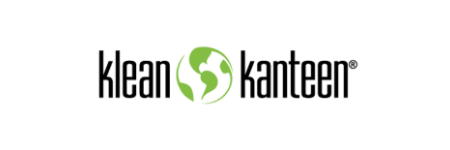
Klean Kanteen
Klean Kanteen is a family- and employee-owned company that builds each product with love for people and planet. They use their business as a force for good and are always working to find new ways to reduce their environmental footprint as a brand. In 2022, they made the bold move to convert all their products to be certified 90% post-consumer recycled stainless steel. By making this change, they are able to reduce the impact each bottle has on the planet.
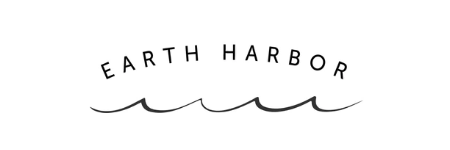
Earth Harbor
Earth Harbor offers personalized, synthetic-free skincare that checks all of the eco-boxes. With an ethical supply chain as the main focus, Earth Harbor sources each ingredient using fair trade, organic, non-GMO, or wildcrafted sources. Plus, each product is vegan and certified cruelty-free through Leaping Bunny.
Logos to Look For
Sourcing Pillar
Company Responsibility
Just like we look at what makes up our products, we also look at how the brands we work with are built. What are their values? How do they show responsibility in the production of their products, the treatment of their workers, and the corners they refuse to cut?
We seek out brand partners who go the extra mile to ensure that the manufacturing and creation of their goods are done ethically and with respect to their workers. This means fair wages, safe and equitable working conditions, and actions that protect and uplift employees. Indicators like Fair Trade Certified, B Corp, Climate Neutral, and Cruelty Free help us ensure that the products on our site were not made at the expense of makers or the planet.
We also want to acknowledge that certifications cost money and sometimes create a barrier to entry when breaking into the sustainability industry. We know that some brands forgo certifications so that they can put money elsewhere into their company, such as paying employees living wages or investing in low-impact packaging. No matter their certification status, we seek out partners who are putting people and planet above profits.
Brand Highlights

Zefiro
Started in 2016 by zero-waste enthusiast Carley Pulford, Zefiro began with selling beeswax wraps at Chicago farmers’ markets, and quickly grew from there! With the motto of “where sustainability meets affordability,” Zefiro’s swaps are an easy way to zero-waste-ify your home without busting your budget. By making their products as affordable as possible, Zefiro aims to provide everyone the opportunity to join the eco-movement. In fact, they even go so far as to equitably price their products with the single-use items they’re replacing!

(re)x
Founder Paulina Quintana is no stranger to the waste produced by the fashion industry. She decided to focus on a seemingly small item with a huge payoff — clothing hangers made from ocean plastic! (re)x partners with a top-of-the-line manufacturing partner, Ocean Plastic Technologies, that utilizes proprietary technology to turn waste into useful household goods! This plastic is sourced directly from local South Africa beach cleanups and recycling efforts. Their hangers provide an opportunity to give plastic waste a new life outside of the landfill.
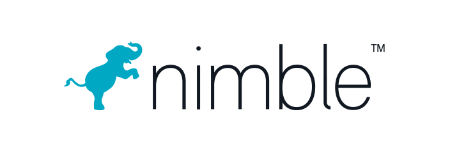
Nimble
Nimble founders Ross, Jon, and Kevin are on a mission to demonstrate a better path for the tech industry. Nimble takes traditional tech products and accessories and produces them using recycled plastic, organic hemp, recycled aluminum, and plant-based bioplastic as alternatives to virgin metals and plastics. They’ve also created a One For One Tech Recovery project, where they’ll recycle one pound of e-waste for every one product sold!
Logos to Look For
Sourcing Pillar
Ownership and Representation
The sustainability industry has a history of being an exclusive and homogeneous space. When sourcing new brands, EarthHero places an emphasis on elevating partners who may have previously been underrepresented in the eco-industry. We actively seek out brands that are female-owned, BIPOC-owned, and LGBTQIA+ owned.
We also seek out products that support inclusion within the sustainability space, whether through give-back programs, non-profit donations, or products that fulfill a specific need. We aim to offer eco-friendly products for everyone and strive to offer clothing sizes for all, personal care for every hair type and skin tone, and product options for people of all abilities.
EarthHero is on a mission to disrupt the status quo and break open the historic barrier to entry for eco-entrepreneurs who are working to make the sustainability world a better, more inclusive and equitable space for everyone.
Brand Highlights

Soap Distillery
Discouraged by the lack of diversity among scented soaps at local health stores, Danielle Martin set out to create a sustainable and inventive alternative. While sipping an Old Fashioned, Danielle came up with the idea for cocktail-inspired soaps that smell and feel delightful. Soap Distillery prioritizes giving back to the community by donating annually to local Chicago organizations like the Broadway Youth Center.

Fat and the Moon
Fat and the Moon founder (and potion maker) Rachel Budde set to work launching a brand that celebrates and empowers both people and planet. Drawing from age-old herbal remedies and plant-powered ingredients, her collection of healing balms and beautifying concoctions elevate the entire self-care experience. Fat and Moon is also incredibly committed to supporting social justice and universal liberation, partnering with organizations such as the Nap Ministry, The Okra Project, and BlackTransWomen.org.

Hive to Home
Hive to Home believes companies hold an important responsibility to make the world kinder and more sustainable. Driven by a desire to make a difference, sisters Holly and Stephanie created Hive to Home out of their kitchen in 2018. A family-owned and operated business, Hive to Home designs and creates farm-to-table beeswax candles donned with hand-drawn political and socially-aware designs. They use locally-harvested beeswax, organic coconut oil, wooden wicks, and reusable glass vessels for the ultimate sustainable candle experience.
Logos to Look For
Sourcing Pillar
Packaging and End of Life
Sustainable products shouldn’t have tons of landfill-bound packaging along for the ride. Minimizing the amount of waste that ends up on your doorstep is important to ensuring a truly sustainable shopping experience.
From the hang tags on your new organic shirt to the bottle containing your vegan shampoo, we want to know – is there plastic? Is it recyclable or compostable? We prioritize sourcing easily recyclable materials like aluminum and cardboard, compostable wrappers, and durable, reusable alternatives like glass, but we love no packaging the most!
Goods made from sustainable materials often have a longer lifespan, but when it does reach the end of its life, it also means it’s easier to dispose of it sustainably. That’s why we prioritize sourcing materials that are readily biodegradable or compostable, like natural fibers, bio-based formulas, paper, or eternally recyclable, like aluminum, stainless steel, brass.
Whenever possible, when a product does come to us with soft plastic or encased in single-use waste, we remove the packaging and dispose of it responsibly through our incredible local recycling organizations. We know not everyone has equal access to recycling and compost so while packaging intended to land at those facilities are great, we aim for zero packaging whenever possible!
Brand Highlights

Sprout
Classic pencils are made with wood that’s often harvested in non-sustainable ways that impact our forests and destroy habitats and biodiversity. But… Sprout pencils are different! Made from sustainably harvested and certified wood, they are crafted with the planet in mind. The core is made from lead-free clay and graphite – no chemicals or toxins allowed. When too short to use, the biodegradable capsule on the stub can be easily planted in a small pot, transforming pencils into gardens!

Plaine Products
Here’s a crazy statistic: Unless change happens, and soon, we are on track to have more plastic than fish in our oceans by 2050. Plaine Products is working to combat that statistic by using recyclable aluminum bottles for their products, as well as offering refills for empty bottles! Plaine Products is dedicated to ingredients, too. Each formula is run through the Environmental Working Group’s database to ensure every product is safe and non-toxic for both people and planet.
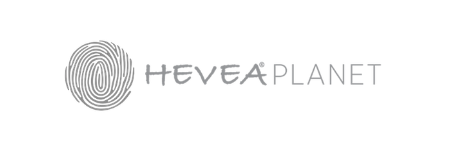
Hevea
HEVEA places enormous emphasis on creating playful products that are gentle on our planet and safe for our kiddos. Each item, whether a puppy chew-toy or a brightly colored pacifier, is made from 100% Natural Rubber and sustainably sourced from Malaysian Rubber Trees. Not only is natural rubber an excellent alternative to synthetic, petroleum-based options, it also boasts the unique ability to fully break down at the end of its life. Additionally, all of HEVEA’s packaging is also compostable!
Logos to Look For
Sourcing Pillar
Give Back
Through our 1% for the Planet work, every product on EarthHero goes the extra mile for our planet and its people, but we love working with brands that take it one step further. Whether it’s a fellow 1% member, or a brand that works with underserved communities and differently-abled peoples, we’re always thrilled to see a brand taking the initiative to improve our world.
From a backpack that donates meals, a bracelet that cleans up ocean plastic, or a sweater that plants trees, choosing sustainable products on EarthHero means every purchase comes with a positive impact.
Brand Highlights

project full
With their organic support cushions, project full is on a mission to bring mindfulness into the everyday routine. Each piece is proudly handmade in Santa Rosa, CA by a local manufacturer that actively works to employ members of the BIPOC community as well those experiencing homelessness. A percentage of all profits are donated to nonprofit organizations that work to bring safe spaces and wellness to underserved communities.

tentree
Founded on the premise that every consumer wants to contribute to the wellbeing of our planet, tentree fuses functional fashion with the power of giving back to create a business model unlike any other. As the name suggests, each tentree product supports the growth of 10 trees, and they have planted over 70 million trees and counting since 2012!

Saalt
Saalt teams up with non-profit partners and donates reusable period care products that provide long-term solutions for menstruation. As a Certified B Corp, they also commit 2% of their revenue to regions in need. Inspired by the United Nations Sustainable Development guidelines, they understand that investing and educating women is one of the fastest and most effective ways to change a community.

